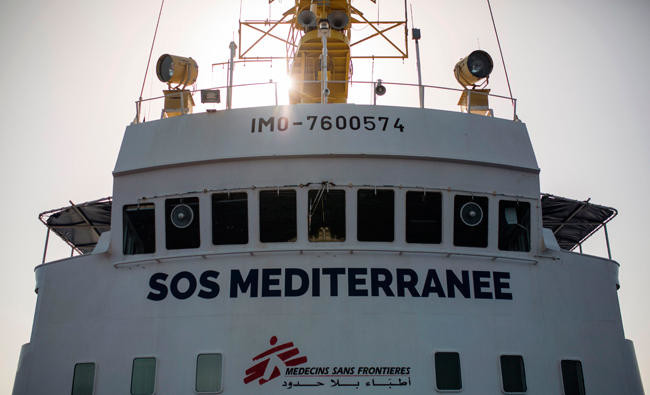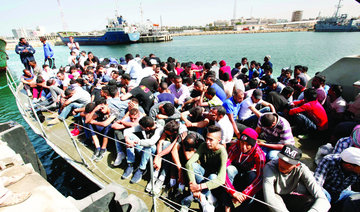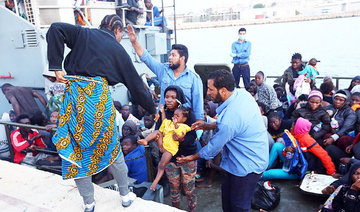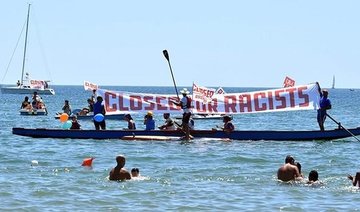ON BOARD THE AQUARIUS: On board the Aquarius, one of the last NGO ships still operating off the coast of Libya, rescuers are worried they are not seeing any more boatloads of migrants at sea.
Libya’s navy, last week, ordered foreign vessels to stay out of a coastal “search-and-rescue zone” for migrants headed for Europe, a measure aimed at non-governmental organizations (NGOs) it accuses of facilitating traffickers in illegal migration.
One by one, the NGOs halted operations, except the Aquarius. The 68-meter orange boat, formerly used by the German coast guard, sailed alone off the Libyan coast on Sunday.
“For the moment, we are continuing our patrol operation in international waters,” said Nicola Stall, search and rescue coordinator for the Aquarius, which is operated by SOS Mediterranee and Doctors Without Borders (MSF).
And so the Aquarius team of rescuers keeps up its two-hour rotation, day and night, to watch for migrants floating on overcrowded and unseaworthy boats.
MSF workers, meanwhile, check their stocks of medications, while other volunteers give the bridge a fresh coat of paint.
As they wait, they are concerned about the calm sea and the favorable winds of the past few days. Despite such weather conditions, they have not seen a migrant boat for a week now.
“It’s very hard to know what is going on in Libya,” says Marcella Kraay, the MSF chief on board. Even during the bad weather in winter, they have never gone more than three weeks without rescuing hundreds of migrants.
“What we’re seeing at sea is that it seems fewer small boats are leaving Libya, and those that do leave are intercepted by the Libyan coast guards,” she says, adding that they were trying to get Libya to clarify the zone that foreign ships are barred from.
The Aquarius may be joined by vessels from the Spanish charity Proactiva Open Arms, which was expected to resume operations on Monday.
Last week Libyan coast guards frightened off most NGO rescue ships when they fired shots in the air opposite one vessel, warning that they would target it directly the next time.
The Aquarius has an emergency plan so everyone on board can lock themselves in should the ship be boarded.
There are about a dozen people from the two NGOs, from several European countries as well as the US and Australia.
Sailors volunteer their time to SOS Mediterranee, while the MSF team includes doctors as well as logistical and technical people, veterans of humanitarian crises such as the Ebola epidemic and the Iraqi battle at Mosul.
The ship’s captain hails from Belarus and the roughly 10 crew members are mostly Slavs, hired with the boat but having chosen to take part in this rescue mission, which has been going on since last year.
At night, the Aquarius keeps about 30 miles from the Libyan coast, mainly to avoid fishermen’s nets. During the day, it moves closer so the coastline is visible, but stays about 24 miles away unless the Italian coast guard calls on them to help with rescues nearer shore.
Six years since a revolution that toppled longtime dictator Muammar Qaddafi, Libya has become a key departure point for migrants risking their lives to cross the Mediterranean to Europe.
Italy, which has borne the brunt of the migrant influx from north Africa, has welcomed Libya’s decision to bar NGO ships and invest more in its coast guard.
The number of migrants reaching Italy is down compared with last year. So far in August, authorities say there have been 1,700 arrivals, far from the 21,300 recorded for the entire month in 2016.
But for humanitarian groups, what happens to migrants returned to or kept in camps in Libya is even more worrying.
“Fewer ships in the area will mean more people will drown at sea. And those taken back by the Libyan coast guards will be kept in captivity, and again exposed to violence, abuse, maltreatment, extortion,” says MSF’s Kraay. “This is really a grave concern.”
Lone migrant rescue ship keeps up patrols off Libya
Lone migrant rescue ship keeps up patrols off Libya

Syria unable to import wheat or fuel due to US sanctions, trade minister says

- The sanctions were imposed during Assad’s rule, targeting his government and also state institutions such as the central bank
DAMASCUS: Syria is unable to make deals to import fuel, wheat or other key goods due to strict US sanctions and despite many countries, including Gulf Arab states, wanting to do so, Syria’s new trade minister said.
In an interview with Reuters at his office in Damascus, Maher Khalil Al-Hasan said Syria’s new ruling administration had managed to scrape together enough wheat and fuel for a few months but the country faces a “catastrophe” if sanctions are not frozen or lifted soon.
Hasan is a member of the new caretaker government set up by Islamist rebel group Hayat Tahrir Al-Sham after it launched a lightning offensive that toppled autocratic President Bashar Assad on Dec. 8 after 13 years of civil war.
The sanctions were imposed during Assad’s rule, targeting his government and also state institutions such as the central bank.
Russia and Iran, both major backers of the Assad government, previously provided most of Syria’s wheat and oil products but both stopped doing so after the rebels triumphed and Assad fled to Moscow.
The US is set to announce an easing of restrictions on providing humanitarian aid and other basic services such as electricity to Syria while maintaining its strict sanctions regime, people briefed on the matter told Reuters on Monday.
The exact impact of the expected measures remains to be seen.
The decision by the outgoing Biden administration aims to send a signal of goodwill to Syria’s people and its new Islamist rulers, and pave the way for improving basic services and living conditions in the war-ravaged country.
At the same time, US officials see the sanctions as a key point of leverage with a new ruling group that was designated a terrorist entity by Washington several years ago but which, after breaking with Islamist militant group Al Qaeda, has recently signalled a more moderate approach.
Washington wants to see Damascus embark on an inclusive political transition and to cooperate on counterterrorism and other matters.
Hasan told Reuters he was aware of reports that some sanctions may soon be eased or frozen.
Libya military says air strikes target smuggling sites

- The Libyan Army said the air strikes “targeted and destroyed fuel trafficking sites in Zawiya, specifically in Asban,” a semi-rural area outside of the city
ZAWIYAH, Libya: Libya’s UN-recognized authorities have launched air strikes targeting drug trafficking and fuel smuggling hubs west of the capital, a military statement said on Monday.
It remained unclear if there were casualties from the strikes in Zawiya, a city on the Mediterranean coast about 40 kilometers (25 miles) west of the capital Tripoli.
Libya was plunged into chaos after a NATO-backed uprising toppled and killed strongman Muammar Qaddafi in 2011, with armed groups exploiting the situation to fund their activities through fuel smuggling and the trafficking of migrants.
The Libyan Army said the air strikes “targeted and destroyed fuel trafficking sites in Zawiya, specifically in Asban,” a semi-rural area outside of the city.
It also called on locals to clear areas it labelled as “strongholds for trafficking and crime.”
In May 2023, the Tripoli-based government carried out drone strikes as part of an anti-smuggling operation, killing at least two people and injuring several others, authorities said at the time.
Those strikes followed clashes between armed groups suspected of involvement in human trafficking and smuggling of fuel and other contraband goods.
Libya’s eastern-based parliament accused the Tripoli-based Government of National Unity of targeting the home of one of its lawmakers, an opponent of the government.
Libya is divided between the Tripoli-based GNU and a rival administration in the east, backed by military strongman Khalifa Haftar.
Footage posted on the army’s Facebook page showed a military truck smashing into the facade of a small dwelling.
Other footage showed tanks and pickup trucks mounted with machine guns driving through Zawiya.
The city hosts Libya’s second-largest oil refinery, with smugglers trafficking the fuel across the border into neighboring Tunisia.
UN envoy in rare Yemen visit to push for peace

- Grundberg’s office said his visit would also “support the release of the arbitrarily detained UN, NGO, civil society and diplomatic mission personnel”
SANAA: Hans Grundberg, the United Nation’s special envoy for war-torn Yemen, arrived Monday in the rebel-held capital in a bid to breathe life into peace talks, his office said.
Grundberg last visited the capital Sanaa, controlled by the Iran-backed Houthis, in May 2023 for meetings with the rebels’ leaders in an earlier effort to advance a roadmap for peace.
The envoy’s current visit “is part of his ongoing efforts to urge for concrete and essential actions... for advancing the peace process,” Grundberg’s office said in a statement.
Yemen has been at war since 2014, when the Houthis forced the internationally recognized government out of Sanaa. The rebels have also seized population centers in the north.
A UN-brokered ceasefire in April 2022 calmed fighting and in December 2023 the warring parties committed to a peace process.
But tensions have surged during the Israel-Hamas war in Gaza, as the Houthis struck Israeli targets and international shipping in the Red Sea and Gulf of Aden, in a campaign the rebels say is in solidarity with Palestinians.
In response to the Houthi attacks, Israel as well as the United States and Britain have hit Houthi targets in Yemen over the past year. One Israeli raid hit Sanaa’s international airport.
Grundberg’s office said his visit would also “support the release of the arbitrarily detained UN, NGO, civil society and diplomatic mission personnel.”
Dozens of staff from UN and other humanitarian organizations have been detained by the rebels, most of them since June, with the Houthis accusing them of belonging to a “US-Israeli spy network,” a charge the United Nations denies.
US says anti-Daesh operation in Iraq kills coalition soldier

- US officials have said Daesh is hoping to stage a comeback in Syria following the fall in December of Syrian President Bashar Assad
WASHINGTON: The US military said on Monday operations against Daesh in Iraq over the past week led to the death of a non-US coalition soldier and wounded two other non-US personnel.
It also detailed operations in Syria against Daesh militants led by the US-backed Syrian Democratic Forces, including one that resulted in the capture of what the US military’s Central Command said was an Daesh attack cell leader.
US officials have said Daesh is hoping to stage a comeback in Syria following the fall in December of Syrian President Bashar Assad.
West Bank camp under fire as Palestinian forces face off militants

- Gunshots occasionally rung out from inside the camp, an AFP correspondent reported this week
JENIN, Palestinian Territories: A month into a crackdown by Palestinian security forces on militants in the Israeli-occupied West Bank, the streets of Jenin refugee camp are deserted, except for a few residents briefly checking on their homes.
Shops are closed, and militants have erected metal barricades to block Palestinian forces, in the area where Israeli army raids are more common.
Black military vehicles from the Palestinian Authority (PA), which exercises limited control over the West Bank, are stationed beyond roadblocks at the camp’s entrances.
“I only came back to check on my house,” said Muayyad Al-Saadi, a 53-year-old resident of Jenin camp, riding a bicycle down roads stripped of pavement.
Saadi, one of around 17,000 Palestinians who live in the camp, fled when clashes began in early December, citing a lack of electricity and running water.
The fighting, triggered by the arrests of several militants, has involved Palestinian militant factions affiliated with opponents of the PA’s leadership.
One of these factions, the Jenin Battalion, is largely made up of fighters affiliated with Islamic Jihad or Hamas, whose October 7, 2023 attack on Israel triggered war in Gaza.
Hamas, in power in Gaza since 2007, is the main political rival of Palestinian president Mahmud Abbas’s Fatah party, which dominates the PA.
Fourteen Palestinians have been killed, including six security forces, seven civilians, and one gunman in the clashes.
Gunshots occasionally rung out from inside the camp, an AFP correspondent reported this week.
Since bakeries have closed, an unusually long line stretched from a shop that delivers bread from outside the camp.
“I’ve lived through wars since I was eight years old,” said the shopkeeper, Umm Hani, who is in her 70s.
She said there was “never anything like this” since the 1967 Arab-Israeli war, when Israel captured the West Bank.
“Let them (the security forces) come and arrest whoever they want. We have nothing to do with it,” said Umm Hani.
Another woman, in her 30s, said: “Everyone wants to speak out, but they’re afraid of repercussions from both sides.”
“We’re suffering. We can’t leave or enter the camp freely.”
The intra-Palestinian clashes erupted amid a major PA raid on the camp after the December 5 arrest of a Jenin Battalion commander on charges of possessing weapons and illicit funds.
Armed factions in Jenin and elsewhere see themselves as more effective resistance to Israeli occupation than the PA, which coordinates security matters with Israel.
“They (the PA) don’t want any resistance against the occupation,” said a fighter carrying an M16 rifle, blocking a road with militants.
The militants accuse the PA of cutting off the water and power supply to the camp, a claim the Ramallah-based authority denies.
“The gunmen fire at electricity and water crews whenever they attempt to repair the networks,” Anwar Rajab, spokesman for the PA forces, told AFP.
He said militants were also shooting at distributors of food aid.
Rajab added that the PA was trying to spare civilians, accusing militants instead of disrupting the lives of residents.
“We’re not besieging the camp. People are entering and leaving the camp normally.”
One gunman said the fighting has been “incredibly difficult for civilians. They have no water, no food, and they’ve stopped working.”
Walls throughout the camp are riddled with bullet holes, some from past Israeli army incursions and others from the recent fighting.
A 19-year-old Hamas fighter, who requested anonymity, said residents of Jenin camp have been exposed to violence long before the current operation.
“Every house here has a martyr, a prisoner or an injured person,” he said.
The fighter accused the PA’s forces of firing indiscriminately.
Both sides have traded blame for the deaths of the seven civilians, including a father and son killed on a rooftop on Friday.
“If they’re targeting us — the resistance factions and the Jenin Battalion — why don’t they come for us directly instead of targeting civilians?” said the young militant.






















